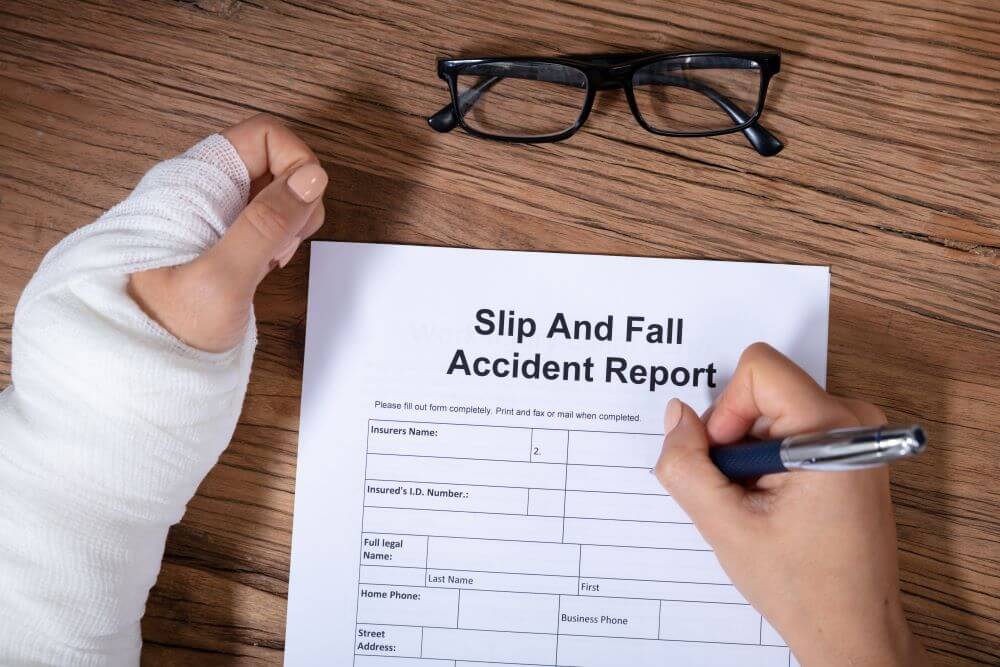By convention, a ‘slip and fall’ claim is filed when someone is injured as a result of a slip, trip, and fall on someone else’s property. A slip and fall accident falls under the legal concept of premises liability. Slip and fall accidents, as the name implies, hold that property owners may be legally responsible for any injuries sustained on the owner’s premises if those injuries are the direct result of the property owner’s negligence.
All property owners are required by law to maintain their property with reasonable care and to keep their properties safe for guests, visitors, customers, and patrons. At Schrier Law Group, we can help file a legal claim for your damages after a slip and fall accident. Consult us for free.
What Types of Slip and Fall Accidents Exist?
Slip and fall hazards change with the seasons and conditions. In the winter, ice and snow left to accumulate on walkways, parking lots, stairways, and sidewalks can have serious consequences. Tripping accidents over uneven surfaces, potholes, and cracks can occur as a result of insufficient lighting in parking lots and walkways.
Poorly illuminated stairwells and steps, whether inside or outside, can also cause slip and fall problems, resulting in serious injuries. Slippery floors, loose or broken flooring or steps, waxed stairs, missing handrails, curled edges, or carpets that are torn, worn, or bulging can all cause a fall; electrical cords or wiring that has been haphazardly construed and left out can trip up a passerby. Clutter and debris left in pedestrian walkways—all of these conditions may result in a slip and fall accident, resulting in a personal injury claim.
Liability Of The Property Owner
Slip and fall cases, in general, fall under premises liability cases, in which a plaintiff claims that the owner or possessor of property caused or failed to fix a dangerous condition that resulted in an injury. Slip and fall accidents can occur in a variety of settings and under a variety of hazardous conditions. The first requirement for a good case is negligence on the part of the defendant.
Negligence
Negligence is the general conception that the owner or possessor of the property failed to maintain the property with reasonable care. An injured plaintiff must prove negligence by establishing the existence of a duty, such as keeping liquid off the floor; breach of that duty; and that the breach was the proximate cause of the plaintiff’s injury. The duty owed to a person depends on whether the property is private or public, as well as your legal status while on the property.
Landowners’ or Occupiers’ Responsibilities
Visitors are typically classified as invitees, licensees, or trespassers, with each having a different duty owed by the landowner or possessor. An invitee is someone who enters the land in response to the landowner’s express or implied invitation. A licensee, like a social guest, is someone who enters the premises with the express or implied permission of the landowner for his or her purposes rather than the benefit of the landowner. A trespasser is someone who enters the land without the permission of the owner.
Common Slip and Fall Injuries
Slip and falls are very common accidents that can happen in a variety of situations and places. Here are some examples.
- Tripping and falling on merchandise that has fallen from store shelves or that has been improperly stored on the floor.
- Slipping on a wet floor in a recently cleaned public restroom with no warning sign.
- Slipping and falling in a parking lot or on a sidewalk in front of a store or office building due to ice or snow.
- In a grocery store, slipping on spilled food or drink.
- Tripping and falling stairs with a handrail that is loose, worn, or missing
- The above list is not limited to them alone; slip and fall accidents can occur anywhere and at any time.
Who To Sue?
Many people or entities are frequently held liable for someone’s injuries. A business may rent space from a property owner in a commercial setting or retail store, and both the property owner and the business (the tenant or possessor/occupier of the property) may be liable. If a third party, such as a management company, was in charge of maintaining the space and failed to do so, that party may also be held liable.
Both a landlord and a tenant may be held liable for injuries caused by dangerous conditions on the property in a residential setting. Special rules generally apply if the property owner is a state agency or municipality.
When Should You File a Lawsuit?
In a nutshell, you should seek compensation for your injuries as soon as possible. You can legally sue for damages or file a compensation claim if you were injured at a business, such as a grocery store, at work, or in a residential setting.
Time is also an issue. You have up to four years from the date of your injury in Florida to file a slip and fall lawsuit. Though that may appear to be a long time, cases involving premises liability can take time. For starters, more than any other type of personal injury case, premises liability will go to trial rather than being settled out of court.
Why You Should Hire an Attorney
A consultation with a slip and fall attorney will greatly assist you in making your decision. It will allow you to discuss what occurred, the merits of your case, the legal options available to you, and what can be pursued. You should not be discouraged by the numerous stereotypes that portray you, the victim, and your attorney as opportunists. Insurance companies frequently perpetuate such stereotypes to avoid having to pay out on a policy.
If you have been injured on someone else’s property and believe it was due to the property owner’s negligence, contact us at Schrier Law Group; our slip and fall attorneys are at your service. We have won substantial settlements and verdicts for victims of property owner negligence for over 20 years. We will assist you in obtaining the just compensation you deserve for your injuries.






